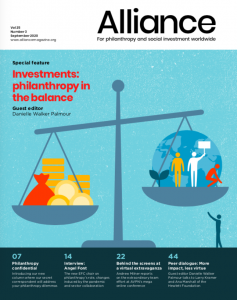The Covid-19 pandemic has produced economic chaos with worse predicted to follow – and the endowments and assets of grantmakers follow the fortunes of the market. How are foundations coping with the financial effects of the crisis? What measures are they taking for the future?
In this web-exclusive peer dialogue, Danielle Walker Palmour of Friends Provident Foundation talks to Richard Robinson of the Paul Hamlyn Foundation (PHF) and chair of the European Foundation Centre’s EFFIO, the European Foundations Financial and Investment Officers Group to find out how the wind is setting.

Danielle Walker Palmour.
Danielle Walker Palmour: I read somewhere that, on average, around 11 per cent was wiped off the value of endowments when coronavirus first started making an impact earlier this year. Though it’s been a turbulent year, with falls like this and with so much economic uncertainty ahead to digest, are foundations having discussions about the impact on grants or other giving policies? I’m thinking for instance of the announcement from Hewlett about reductions in giving in 2021-22 in view of the global recession.

Richard Robinson.
Richard Robinson: March was dire, with steep and very rapid reductions in value and as you say, that brought falls in value for foundations over the three months to the end of March of between nine and 13 per cent, depending on currency and asset mix. But it has been followed by sharp recoveries in Q2 and into this quarter. The market moves are highly concentrated and reflect the acceleration of technology adoption across economies. The median stocks have not fared as well as the index leaders. In terms of grants, there has been really significant interruption to the normal routine of work. I am not part of the grants team but I know we have worked hard to fast-track a £20m hardship fund to help grantees who were facing the immediate shortage of liquidity this year. Just with the commercial economy it was not easy, early on, to assess the probable path this crisis was taking, I am not sure it is now, but the sector has worked hard to adapt and grant spend is ramping up sharply.
Has the crisis brought new or amended forms of governance? If so, what are they – more frequent meetings? Creation of, or changes, to the investment committee? New or different expertise? New collaborations, etc?
In any sort of a real crisis, especially one so novel as a pandemic with significant morbidity, there is a tendency for networks to be formed or work closer together and so it has been these last few months. It is also a by-product, I suspect, of working from home. One needs to work harder to stay connected and in touch. The first weeks of this crisis were characterised by an exceptional level of sharing of information and opinion, much of it science-based as in the initial period we worked to find out what on earth we were all facing.
Just with the commercial economy it was not easy, early on, to assess the probable path this crisis was taking, I am not sure it is now, but the sector has worked hard to adapt and grant spend is ramping up sharply.
At PHF, we moved to weekly updates for the investment committee and formal meetings via Zoom every three weeks. After a period of these, now the markets have stabilised we have stood this down and moved back to the usual frequency, which is every eight weeks. For a time, we also sought and got greater levels of executive action delegated to the Investment Director and the chair of the investment committee, but we had also done this sort of fast-tracking on previous occasions, most recently during the Brexit negotiations when managing the sterling and non-sterling currency exposures had needed careful handling in September 2019.
Do you think the crisis will have a scarring effect on the value of endowments? What planning horizon are you and your colleagues using?
We have been cautious for several previous quarters, indeed we began de-risking our portfolio in 2017! Too early, as it turned out. Trump arrived and the investment markets went up, but we carried on weeding out managers and portfolio structures in which we had less than full confidence. In a world of greater complexity, we sought simplicity. There is a tendency towards the end of every economic cycle to launch more and more complicated investment products, all of which sound beguiling but usually offer little liquidity and involve high fees. We have worked hard to avoid these and to prune what we did have. Because of that, we entered the crisis quite lean and with low expectations. Nothing we have seen in the recent months has made us more optimistic for the next three years.
Looking ahead, what data or trends are you and your colleagues using for planning purposes? Do you anticipate amending mandates? Will the search for beta – in other words, stabilising the market – be more important than demanding alpha, or outperformance of the market?
We think we are entering a bear market. The arrival of the coronavirus has really accelerated and exacerbated trends that were already present before 2020. Most of these are not friendly to those reliant on returns from capital, although potentially many of them, such as including carbon pricing in the capital asset pricing model, were very necessary and way overdue. Accelerated Government spending will bring overall debt to levels that will likely force a wholesale recalibration of the tax system and this is at a time when consumer demand is weak. That’s a very difficult backdrop for markets but they have just had a decade, indeed several decades of good returns. It is give-back time.
Danielle Walker Palmour is director of the Friends Provident Foundation and guest editor of Alliance magazine’s September 2020 issue on foundation investments.







Comments (0)